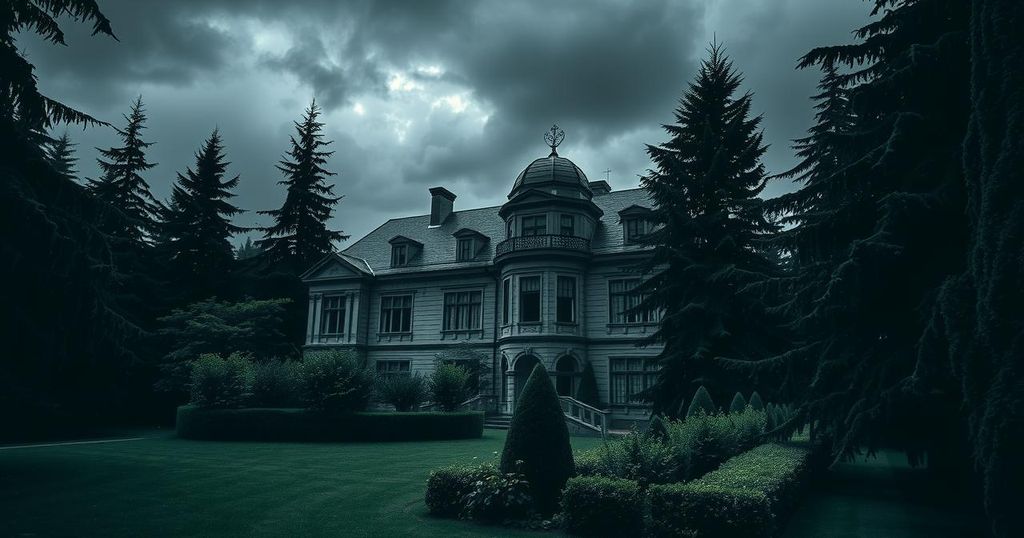Venezuelan President Nicolás Maduro’s government has maintained a siege on a mansion housing five members of the opposition for a year. Their confinement stems from treason charges, leading to deteriorating conditions as food and support dwindle. Negotiations for their safe passage have stalled amidst complex political maneuvers involving the United States and Brazil, leaving the situation precarious as they await resolution.
For the past year, Venezuelan President Nicolás Maduro’s government has maintained a tight siege on a mansion in eastern Caracas, where five opposition members reside. Armed security forces frequently surround the Argentine Embassy, threatening to breach it multiple times. The power supply was cut off last November, and food deliveries have become exceedingly rare, leaving its inhabitants in a precarious situation.
These five individuals are key allies of María Corina Machado, the most formidable challenger to Maduro’s leadership over the last twelve years. They entered the mansion after the government issued arrest warrants based on accusations of treason and conspiracy. Following widely contested election results, they opted to remain confined rather than surrender to authorities.
Currently, the mansion is devoid of other occupants since the Venezuelan regime expelled Argentine diplomats last summer, and local staff ceased operations due to security fears. Brazil has offered protection for the remaining individuals since August and has attempted to negotiate for their safe exit from both the residence and Venezuela. However, discussions have yet to yield any concrete results.
Pedro Urruchurtu, a 34-year-old adviser to Machado, indicated the emotional toll of their confinement, stating, “It’s a rollercoaster of emotions, and one tries to stay focused, with high spirits, but it’s difficult.” Political expert Benigno Alarcón posits that the ongoing siege serves as a tactic to pressure Machado, who is currently in hiding.
The Venezuelan government refutes claims of a siege, with Interior Minister Diosdado Cabello describing the situation as a “charade.” As the five men mark one year in the embassy, the political deadlock in Venezuela has continued amid inconsistent U.S. policies regarding the country. President Trump’s administration had varied approaches, including diplomatic engagement with Maduro and subsequent punitive actions that have confused observers.
The daily routine for Urruchurtu includes reading, writing, and exercising to maintain structure. Omar González, a 75-year-old journalist, conducts vigilant watch shifts to ensure the safety of the group. They rely on a basic food supply of canned goods due to restrictions on deliveries and survive with limited resources.
This scenario is not new, as other opposition leaders have sought refuge in foreign embassies previously. Yet, the Maduro regime’s aggressiveness in engaging with foreign diplomatic premises has escalated. After initially allowing the aides to seek asylum, the government reneged, exacerbating their situation.
Brazil has offered a military plane for the opposition members to escape to Argentina, but recent efforts for safe passage have failed. Urruchurtu expressed the group’s willingness to negotiate a lawful exit from Venezuela amidst threats from the regime.
As the five continue to face an uncertain future, they ponder why the government has not forcibly entered the mansion. González reflects on their experience, stating, “I think they’ve taken us hostage.” They remain hopeful for an end to their plight soon.
The year-long standoff between Venezuelan opposition members seeking refuge in an embassy and Maduro’s regime highlights the dire situation in Venezuela’s political landscape. Despite pressure tactics and physical siege, the group remains resolute, although living under continuous threat of arrest. This incident underscores the complex interplay of internal and external political dynamics, including Brazil’s attempts at mediation and the inconsistent policies of the United States. The eventual outcomes for these individuals remain uncertain amidst ongoing political tension.
Original Source: www.batimes.com.ar






